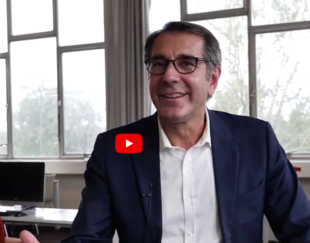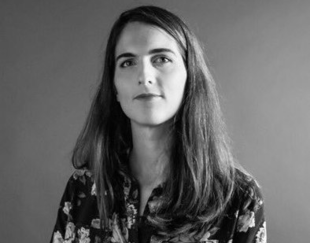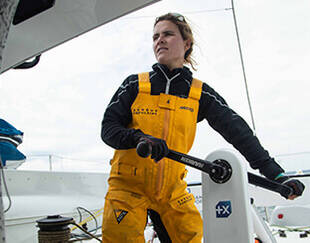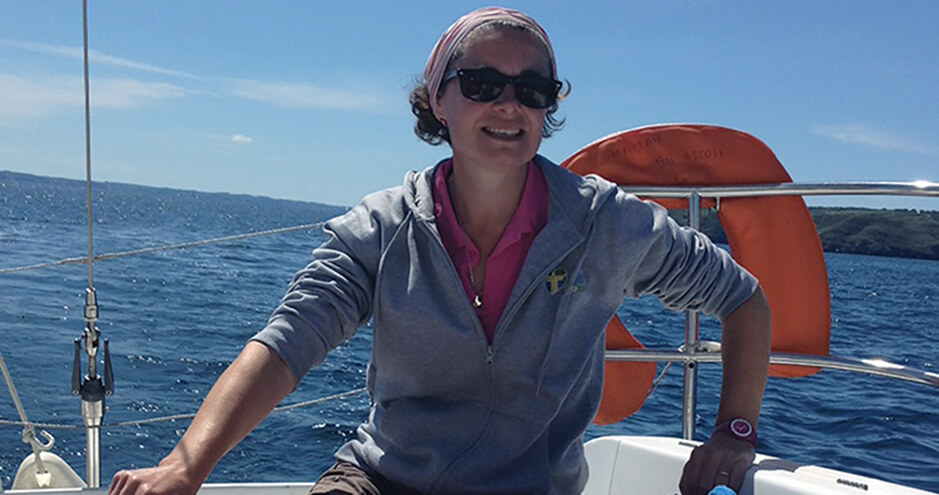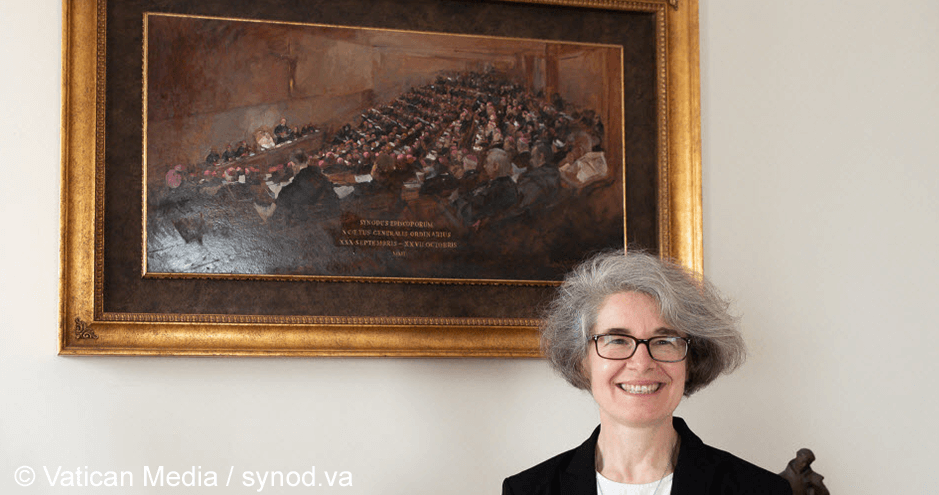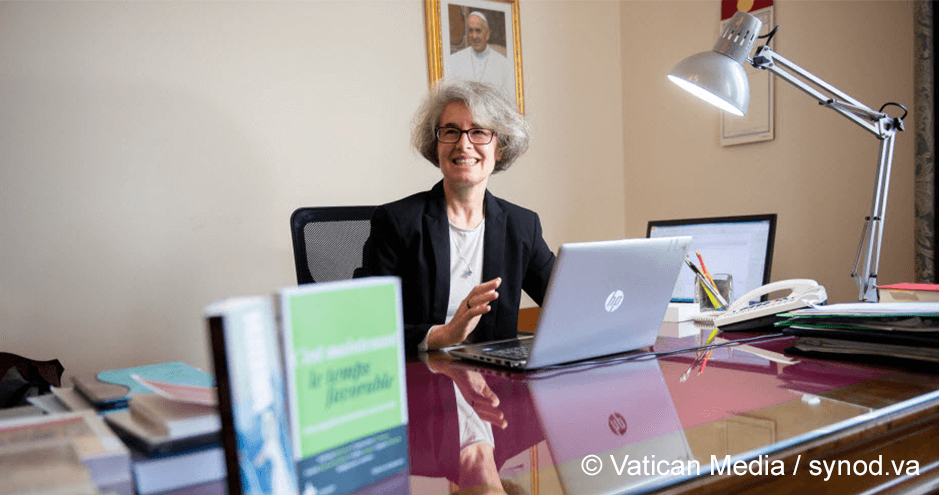HEC Graduate Nathalie Becquart Breaks Glass Ceiling at Vatican
In a historic break from the Vatican’s past, Pope Francis named the first-ever woman, Nathalie Becquart (H92), to a voting post in the Synod of Bishops. As the body’s undersecretary, Becquart will thus be able to discuss and vote on key doctrinal issues during the Catholic Church’s Synod, set for October 2022. In an exclusive exchange with HEC Newsroom, the 52-year-old confided: “When the Vatican called me, I first thought: ‘I’m in a harbor with a new voyage, a new call guiding me into the deep blue sea.” The February 6 nomination was an appropriate way to celebrate the centenary of the Xavières Congregation of religious sisters in which Becquart was deeply involved for over two decades.
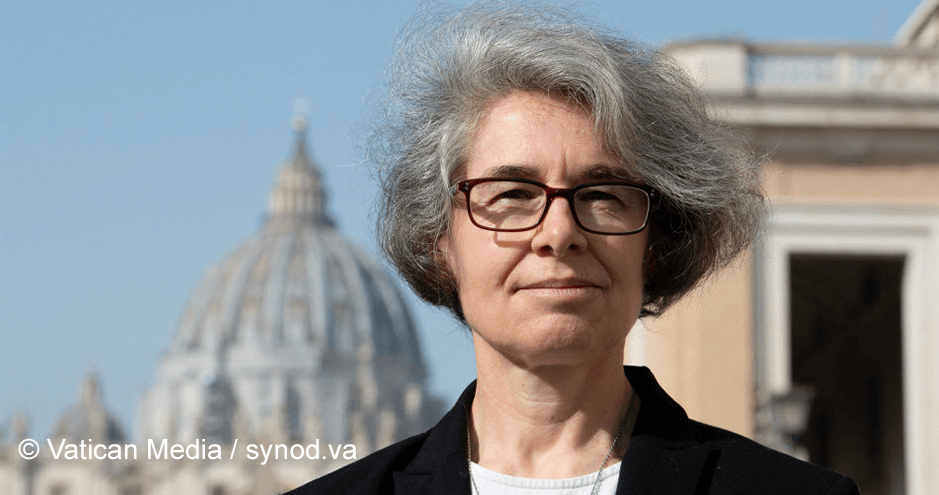
Congratulations for this nomination which we will discuss in detail later. But, first, let us go back to your three years at HEC Paris. I’ve read that they had a deep impact on your subsequent career…
Nathalie Becquart: Oh, yes. I’d say there are several experiences which that have really played a strong role in the 29 years since I graduated. Coming out of my years of prépa, I had a very academic view of my studies. HEC was quite a change, with different approaches and new subjects like accountability and management. It acted as a balance, more hands-on and interactive. For, in my first year, I simultaneously began to take some courses in theology and philosophy at the Jesuit Faculty of Paris and the Sorbonne. That was a way of nourishing my reflections on my faith, something I continued well after graduating from HEC.
In my second year at HEC, I started an international track, a new, all-English option which brought together professors and students from all over the world. The focus was cross-cultural management. I mention this because this cosmopolitan environment has dominated my path ever since. Through my different missions in the church then, I have been alongside international students, I worked with migrants and children of migrant families. Then, during my 10 years at the Bishops Conference France, running the National Youth and Vocation branch, I was constantly interacting with people from round the world. Since, I’ve been involved in many European and international meetings at the Vatican, I’ve spent the last two years in North America (Toronto, Chicago, Boston) and my new functions are an extension of these exchanges. So, reflecting on my journey, I can say this all began at HEC, where I experienced cross-cultural and intercultural learning. At the time, I learnt about business English, then I plunged into church English and now I have to improve my Italian, the first working language at the Vatican!
What about the studies themselves at the business school?
Well, my choice to focus on entrepreneurship had a major impact on my career. To be frank, I was not so happy with my other academic courses during the first two years. With HEC’s entrepreneurship courses for my third year Major, I loved the practical side. I learnt a lot about teamwork, collaborating with students from other backgrounds and cultures. This gave me a strong experience of management, project management and entrepreneurship, which have been very useful for my pastoral work with the Church. For example, when I was in charge of the World Youth Day for our French delegation, I was coordinating a big team. The training I received at HEC was as useful as my experience with the Church.
But it wasn’t just about studies…
Yes, you could say my strongest experiences at HEC centered on sailing. I’m a sailor, I learnt very young in Brittany, with my family. I joined the HEC Sailing Club and actually became its first woman president in my second year. I did twice the Tour de France à Voile and countless regattas. Funnily enough, Clarisse Crémer followed my footsteps a few years later, I’d like to exchange with her on that someday…
But it wasn’t just about sailing and being a skipper, you know. There are so many skills needed to manage the crew, choose tactics, have a strong organization, discipline and hygiene of life! I loved it. I think that in my three years at HEC, I probably sailed three months a year, starting off at La Trinité-sur-Mer every two weekend, and so on. I consider it an experience of life, of leadership.
Then, when I decided to enter religious life after a work experience of two years as Consultant in Marketing-Communication, I thought it was the end of my sailing days, that I’d never step foot on a boat again. But, after four years as a Xavières sister, I was called on to sail again, this time with young people, providing them with retreats on the water (Becquart presided over "Life at sea, entry into prayer", an organization which offers young people spiritual retreats on sailboats, Ed.) It was a great way to renew with the sea and, at the same time, to minister to young people, guide them in their lives. As a sister, I’ve continued to be a spiritual guide on seafaring boats. I often rely on my HEC sailing experiences for work. It involves crisis management, discerning with others and finding peace inside oneself. Even when I was called to come here to the Vatican, I felt: "I’m in a harbor, with a new voyage, a new call guiding me into the deep blue sea." This was another gift from HEC.
Speaking of the Vatican, let’s turn to your appointment by Pope Francis as Undersecretary of the Synod of Bishops, alongside Mgr. Luis Marin de San Martin. In interviews, you’ve said this is the Church’s way of catching up with the world and praised it as an “audacious gesture” from the Pope. In your opinion, why do you feel it took so long for the Vatican to open up to the woman’s vote at the highest echelons?
The Catholic Church has a long history, and the Vatican is one of the oldest institutions in the world. The early Church was synodical, collegial, and not so well organized. It was like the beginning of a startup! You have a first phase, with lots of things to fix. From the Middle Ages until the Second Vatican Council, or Vatican II (in 1965, Ed.), the Church changes as it had to relate to the dominant political powers. There was an emphasis on a more hierarchical way, a concept of the church as a “perfect society” with priests and bishops above the rest. The Church is a human and divine reality influenced by the different socio-cultural contexts and therefore evolving throughout history. The Second Vatican Council changed the mindset – and the world changed, too. There was a renewal, a will to rediscover and retrieve the original Church vision.
We are still in the transition phase, after over a 1,000 years of pyramidal, clerical domination, where leadership was linked to ordination. After Vatican II, new ways were instigated focusing on the vocation of all those baptized. At the end of Vatican II, the Pope asked women to be auditors. It was the beginning of us taking part in decision-making process. My appointment is part of this long process. It was made possible by earlier steps, like me being part of the 2018 Synod of Bishops on Young People (in which Nathalie Becquart took a pivotal role and wrote a research paper, Ed.). 10% of those involved were women, but these 10% played major roles. Those present asked for a higher percentage of women to be involved.
These things take time but a grassroots change of mentalities and of structures has made it all possible. The Church is shaped by very old structures, but more and more things are changing at the local and global level. I often talk about the experiences in the corporate world and its link to the Church. There aren’t many women CEOs, not enough, it’s not so easy to change!
To be honest, I was surprised my appointment made such a noise in the media. It meets people’s desire to have better man-woman relationships, there’s the Me Too movement, but it’s a long road. We’re not just talking about the Church, but society at large.
There’s an estimated 630,000 sisters in the Catholic Church worldwide and many feel you represent them. Do you feel a certain responsibility towards them?
Yes, I do. But I feel I can live with this responsibility only by being very connected to the people at grassroots level. I received many messages of support from all over the world, many women feel it’s their appointment. And it’s not just religious followers, many lay people also wrote to me, and that’s very important. It’s not like organizing in the corporate world. It’s not enough to have a good leader or good board only. You need to have all the people in the company involved and that goes for the Church, too. I have a responsibility to listen to all the people of God, the Church is for everyone. An effective dialogue is a close dialogue.
When you become a leader, it’s so easy to be disconnected, to be in your small world where you get used to leadership. So the challenge for me is not to do anything without the people. The conviction of the Catholic Church is to serve the common good in the society with this view from Laudato Si that the earth has to be considered as our “common home”. The Holy Spirit doesn’t only speak to people in high positions, it speaks to everyone. So, it’s truly important to reflect this participative spirit in the synodal style. The challenge is that the Church is not an organization like any other. It is not exactly a democracy as a political system and it must find its own way to involve all the protagonists through a participative process that is a spiritual process. Finally, it must foster more collaborative management. You can’t copy and paste a business plan. The issue is to discern together, listening to each other in order to find how best to love and serve the people.
This way, called synodality, is based on great reciprocity within a relational approach that can’t disconnect the leaders from the members of the community they serve. The next Synod of Bishops – “For a synodal Church : communion, participation, mission” - will be a gathering built on two years of preparation, with the participation of the grassroots adherents in a long consultation process in every country to discern our priorities. It’s a process ending with delegates of Bishops from all over the world spending a month with the Pope. Not many world leaders spend a month devoted to such an exchange, and I hope it can inspire other bodies. That’s why this is so important for me, this reciprocity between the Church and other organizations.
How exactly are you preparing for the October 2022 Synod of Bishops?
The Synod will focus on a new style of leadership, a more collaborative one. We are seeking to help churches at a local level. Vatican II is 66 years old; the world context has changed and this new theological vision of synodality centers on learning by doing. As I mentioned earlier, the emphasis will be on teamwork to promote synodal process at all levels of the Church.
Our General Secretariat of the Synod is a small permanent team of 15 people, with a large network of experts. We have first to work in a synodal spirit ourselves. Nowadays, we must take our part in the challenge of creating a different Church culture embraced by Pope Francis which maintains a unity while respecting the particularities of each local church. Something I learnt at HEC which serves me every day is: “Think global, act local”. And to stick by one’s convictions, to learn to dare. I learnt that with sailing because when you are on the sea, there are always risks. It’s the same with all my experiences with the Church when I was working with the youth. You need to dare, take risks, not crazy risks, but you need to assess all the elements boldly.
Today, the world is in crisis, there’s a lot of work to answer the pandemic and its consequences. Pope Francis created a think-tank and committees to map out the changes our societies need one year ago in the Roman Curia. To help the world, the Church must also change and implement synodality to answer the challenges posed by the environmental crisis, the health issues, poverty, and inequality, all of which have accelerated with the COVID-19 crisis.
A final message to HEC students?
I’ve been thinking a lot about the students recently as they face many struggles and difficulties in the midst of this pandemic. My first message is to keep confident and hope, especially at HEC where students have worked so much and received such great educations. They are gifted but they can’t keep those gifts for themselves. This crisis highlights our interdependency. The only way to get out of this crisis is by working together. We’re all in the same boat, worldwide. So, we can’t focus only on ourselves, on money and material comfort. Mine is a call for solidarity, for fraternity, especially amongst the young students at HEC. You must ask yourselves: “How will I serve the common good? What can I bring others, in order to build a better world?”
I’ve written a book with four other sisters, a theological and philosophical approach to this time of crisis. These are difficult times and there is a lot of suffering, and we are being asked to deepen existential questions, to dare to change, not only personally, but collectively. We must help to change the structures that generate so much inequality and poverty because we are in a world of crisis, with so many people suffering. So, HEC students have a responsibility to answer this call.
Related News
